Iran's Gas Pipeline Network Hit By ‘Sabotage Blasts’
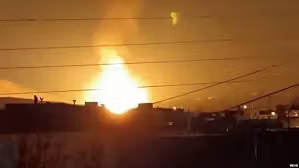
Iran's main gas pipeline network had been struck by multiple explosions around the country, with local officials labeling it as "sabotage".

Iran's main gas pipeline network had been struck by multiple explosions around the country, with local officials labeling it as "sabotage".
The blasts occurred in central Iran along a crucial south-north gas pipeline, though officials speaking to state TV said there were no casualties.
The director of Iran's Gas Network Control Center, Saeed Aqli, said that “around 1 am, sabotage explosions occurred at various points along the country's national gas pipelines,” in multiple provinces where crowds gathered in the street.
As of now, no group has claimed responsibility for the explosions. Oil Minister Javad Owji, confirming the suspected sabotage nature of the blasts during a cabinet meeting, stated that “the enemies' objectives to disrupt gas supply to major provinces were not successful.” He claimed that gas would be reconnected by noon and all pipelines would be repaired and operational by sunset.
However, several Iranian media outlets reported that gas supply to industries and offices would be disrupted on Wednesday across several provinces due to the incidents.
Since mid-2020, there have been multiple unexplained explosions and fires at different Iranian military, nuclear, and industrial sites, including pipelines and refineries. Despite authorities not offering comprehensive explanations for the incidents, they have linked several prominent sabotage attacks on facilities to its archenemy Israel. Nevertheless, Israel has not formally acknowledged responsibility for any of the events.
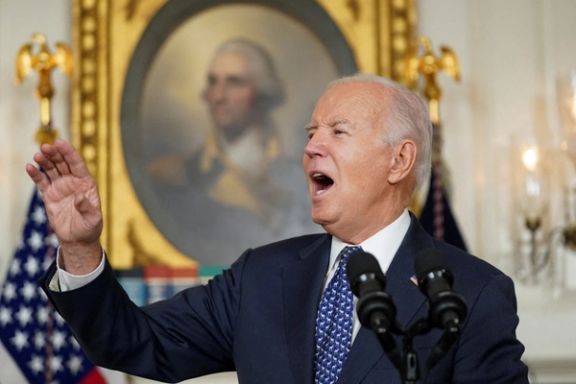
The Biden administration is pressuring the House of Representatives to approve more funding for Ukraine, saying a failure to do so would amount to helping Russia and Iran.
“A House vote against American national security is a vote to appease and empower the Iranian regime. Period,” reads a White House memo aimed at Republican representatives and seen by several journalists.
The memo, written by senior Biden adviser Andrew Bates, argues that since Iran is helping Russia against Ukraine (and Hamas against Israel), not passing the legislation would strengthen Iran’s position.
“Iran is integral to Putin’s war effort in Ukraine,” reads the memo, “providing him with weapons and financial support. Right now, Russians are killing Ukrainian civilians with Iranian drones. Iran is even considering supplying Russia with short-range ballistic missiles.”
The intervention is remarkable with respect to Biden’s Iran policy. For almost three years, House Republicans have been pushing Biden to adopt a tougher stance on Iran, warning him about the dangers of an ascendant Islamic Republic. Now the table seems to have turned, and it’s Biden stressing the perils of not taking the threat seriously.
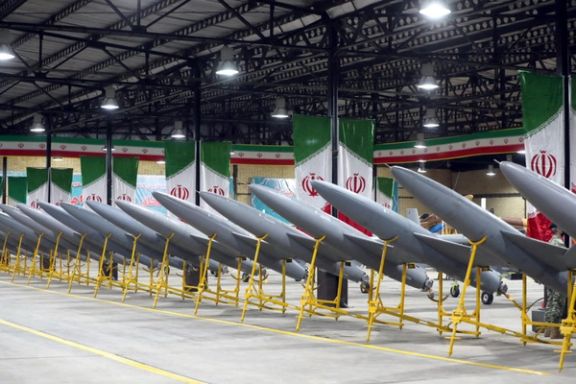
Iran has provided hundreds of kamikaze drones to Russia that have been used against civilian targets and infrastructure, forcing Ukraine to use expensive Western air defense weapons against the cheap Iranian drones. There have been reports that Tehran might have also supplied ammunition and even possibly missiles.
The bill asks for $60 billion for Ukraine and $14 billion for Israel (as well as $5 billion for US allies in the Far East and $9 billion for humanitarian aid). It passed the Senate Monday but faces an uphill battle in the House, where speaker Mike Johnson has called it “dead” before hitting the House floor.
The Biden administration and the Democrats in the Congress have accused Johnson and other opponents of the bill of kowtowing to Donald Trump, who has expressed his opposition to the bill and called on the Republican lawmakers to reject it.
Trump critics say he’s opposing the bill because it includes a bipartisan deal to address the US ‘border crisis’, which may rid him of a potent weapon against the Democrats in the 2024 election campaign.
The memo includes an indirect but clear reference to Trump, who raised many eyebrows last week when he suggested that the US should exit NATO, and Russia should attack members of the alliance. Reminding the Representatives of their “stark” choice, the memo reads: “unhinged, irresponsible voices on the right are even encouraging Russia to attack our closest allies and agitating to unravel NATO.”
Speaker Mike Johnson has cited border control as his main source of opposition to the bill and its selection for vote in the House. “National security starts with border security,” he said Tuesday, responding to the administration’s claim that the failure to provide help to Ukraine would affect national security.
Earlier Tuesday, Biden had called on the House to pass the bill on that very ground.
“If we do not stand against tyrants who seek to conquer or carve up their neighbors’ territory, the consequences for America’s national security will be significant,” Biden said in a statement. “It is time for the House to take action and send this bipartisan legislation to my desk immediately so that I can sign it into law.”
Analysts say such interventions prove that the Biden administration is far from confident in the bill’s chances.
“Will House Republicans side with President Biden and Senators on both sides of the aisle in supporting American national security? Or will House Republicans, in the name of politics, side with Vladimir Putin and the regime in Tehran?” the memo reads. “The House GOP cannot lose sight of this binary choice.”
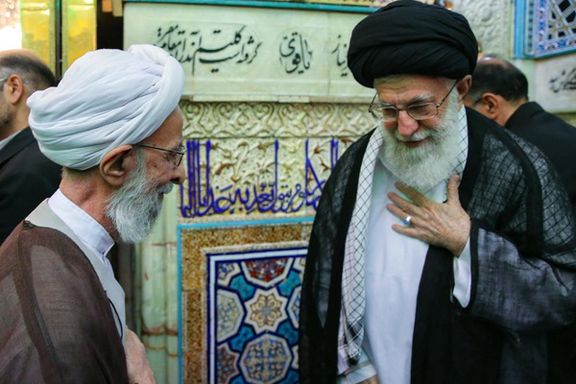
The ayatollah who was the fervent proponent of pure Islamic rule as distinct from the Islamic Republic died in 2021, politicians using his ideology were gaining power in Iran.
Iranians had all but consigned Ayatollah Mohamad Taqi Mesbah-Yazdi to the annals of history. However the ascension of President Ebrahim Raisi to power in 2021, following Mesbah-Yazdi's passing that same year, brought the cleric's influence back into sharp focus. The political landscape of Iran shifted once more as Paydari seized control of the government and parliament.
Prior to the 2010s, Mesbah-Yazdi remained largely obscure, save for his association with populist President Mahmoud Ahmadinejad, whose rise to power was aided by Mesbah-Yazdi's disciples. Those familiar with him understood his contentious relationship with the founder of the Islamic Republic, Ayatollah Ruhollah Khomeini, stemming from Mesbah-Yazdi's early opposition to Khomeini's revolutionary ideals before the 1979 Islamic revolution.
Mesbah Yazdi's reluctance to engage in overt political activities until after Khomeini's demise, likely stemmed from this antagonism. It was only with the ascent of Ali Khamenei to Iran's leadership in 1989 that Mesbah-Yazdi emerged from obscurity, advocating for Khamenei's authority as the direct conduit between God and the populace. Mesbah-Yazdi contended that Khamenei's appointment was divinely ordained, bypassing the need for electoral or popular validation, positioning him akin to a prophet who could transmit God's law without intermediary.

In a recent report about Mesbah-Yazdi, Iran’s Rouydad24 website wrote that Mesbah was born in 1934 in Yazd in central Iran where he later studied at the seminary before leaving for An-Najaf in Iraq to continue his studies. However, he returned to Iran after only one year and continued his studies at the religious school of Ayatollah Boroujerdi and then Ayatollah Khomeini.
It was in Qom that he further developed his theory of pure Islamic (Shiite) state partly in collaboration with former President Akbar Hashemi Rafsanjani and former Judiciary Chief Mohammad Beheshti who later disagreed with his radical totalitarian ideas. Later, he studied at the Haqqani Madrasah, which was established in the 1950s as a place to politicize Shiism. The Madrasah is today notorious for producing some of the most violent militant clerics that ruled in Iran during the first decades of the Islamic Republic.
It was at this Madrasah that Mesbah-Yazdi published a journal named Enteqam [Revenge] which propagated hate speech and violence against the secularist monarchy.
His glorification of violence in the 1990s and 2000s, which led to the mass murder of intellectuals by government agents revealed the practical implication of the school of thought he developed during that period. Coupled with a paranoia about "infiltration" by "others" his ideas turned into something sinister and dangerous. Rouydad24, quoted him as having said in July 2002: "Identify the Satanic mercenary elements. Silence any opposition to the Supreme Leader. If they are ignorant, explain the matter to them, but if they have ill intentions, kill them by strangulating them!"
Despite Mesbah-Yazdi's influence on political rhetoric, particularly within the Paydari Party, his ideas often remained superficially understood, with many adherents prioritizing self-interest over ideological fidelity. The prevailing ethos among Paydari members emphasized personal gain, be it financial resources or political power, often at the expense of Mesbah-Yazdi's original principles. His ideology was and remains a useful tool for those who want to monopolize power using a rallying point.
As Paydari consolidates its grip on Iranian politics, the Islamic Revolutionary Guard Corps (IRGC) emerges as a potential counterbalance. With over 70 IRGC officers reportedly serving in the Majles, including influential figures like Speaker Mohammad Bagher Ghalibaf, they represent a formidable force capable of tempering Paydari's dominance, ensuring a delicate equilibrium within Iran's political arena.
According to one of the latest headcounts, at least 24 top officers of the IRGC were members of the outgoing parliament, including Ghalibaf. They may not represent a large bloc, but their influence is undeniable as Khamenei uses them to counterbalance Paydari.

Iran's Foreign Minister Hossein Amir-Abdollahian met with Hamas' political bureau head, Ismail Haniyeh, in Qatar on Tuesday amid the ongoing Gaza war.
Despite its continued denial of involvement in the October 7 atrocities, which resulted in the death of 1,200 mostly civilians, with over 250 individuals taken hostage to Gaza, Tehran continues its public meetings with Palestinian militant groups, long supported, armed, and trained by Iran.
In Lebanon on Saturday, the foreign minister also met leaders of Palestinian militant groups in addition to its biggest proxy, Hezbollah.
He has been on a whirlwind tour of the region which began Friday. While in Doha, where Gaza militants Hamas has long had one of its foreign outposts, Amir-Abdollahian held separate talks with his Qatari counterpart and the Emir of Qatar.
Qatar marked the final leg of the Iranian diplomat's regional tour. In Syria, Amir-Abdollahian had also met with regime-backed militant leaders, in addition to President Bashar al-Assad.
Since the outbreak of the Gaza war, Israel has been increasing airstrikes on Iranian-backed military targets in Syria, with reports of high-level killings of Iranian military personnel since the outbreak of the conflict.

Iran's Islamic Revolutionary Guard Corps (IRGC) said on Tuesday it has launched long-range ballistic missiles from a warship for the first time.
The announcement came during naval exercises with the IRGC deploying two ballistic missiles from the Shahid Mahdavi warship.
The IRGC claims that the missiles can strike targets up to 1,700 kilometers (1,050 miles) away.
"The IRGC has initiated the firing of ballistic missiles in the Gulf of Oman for the first time," state television reported.
IRGC Chief Hossein Salami stated, "The launch of a long-range ballistic missile from the warship was executed with success."
In a warning on Tuesday, Salami said, "In the event of a naval conflict and our ships being targeted, we will respond with equal or greater force."
Additionally, state television reported that the IRGC conducted a simulation of a surface-to-surface ballistic missile strike on Israel's Palmachim airbase from central Iran. The base serves as a critical facility for F-35 fighter jets in Israel.
The military maneuvers unfold amid heightened regional tensions following the eruption of the Israel-Hamas conflict on October 7. Iran, which does not recognize Israel, has long opposed it and supported Palestinian terror groups since the 1979 Islamic revolution.
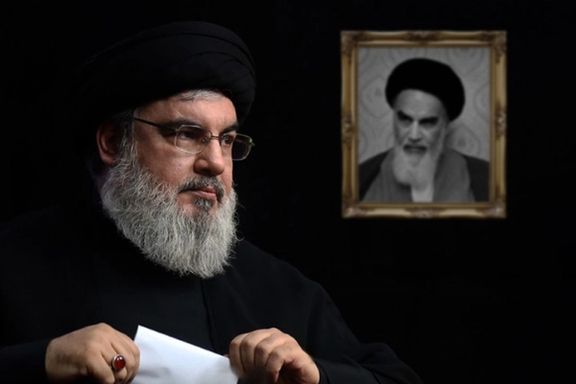
The leader of Iran-backed Hezbollah in Lebanon said on Tuesday that his group's cross-border shelling into Israel would only end when Israel's "aggression" on the Gaza Strip stops.
Hassan Nasrallah claimed that diplomatic efforts so far to bring a halt to hostilities along Lebanon's border seemed to only benefit Israel.
Hezbollah has been trading fire with the Israeli military across Lebanon's southern border in support of its Palestinian ally Hamas, since war started on October 7 that was met with heavy Israeli bombardment by land, air and sea.
Nasrallah said his group would only stop its exchanges of fire if a full ceasefire was reached for Gaza.
"On that day, when the shooting stops in Gaza, we will stop the shooting in the south," he said in a televised address.
He said many foreign "delegations" had travelled to Beirut with "proposals" to end hostilities in southern Lebanon, but said they only seemed to "have one goal, which is: the security of Israel, the protection of Israel."
The foreign ministers of France, Britain, and other countries have travelled to Lebanon in recent weeks to bring calm to the border.
France's foreign minister delivered a written proposal to Beirut that calls for Hezbollah's units to withdraw 10 km (6 miles) from the border.
"You read the paper - there's nothing. There's Israel's security," he said.
The cross-border shelling has already killed around 200 people in Lebanon, including more than 170 Hezbollah fighters, as well as 10 Israeli troops and five Israeli civilians. It has also displaced tens of thousands of people in each country.
Nasrallah said residents of northern Israel "will not return" to their homes and threatened that even more would be displaced.